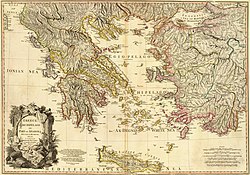This article needs additional citations for verification. (February 2019) |
| History of Greece |
|---|
 |
|
|



The Frankokratia (Greek: Φραγκοκρατία, Latin: Francocratia, sometimes anglicized as Francocracy, lit. 'rule of the Franks'), also known as Latinokratia (Greek: Λατινοκρατία, Latin: Latinocratia, "rule of the Latins", Latin occupation) and, for the Venetian domains, Venetokratia or Enetokratia (Greek: Βενετοκρατία or Ενετοκρατία, Latin: Venetocratia, "rule of the Venetians"), was the period in Greek history after the Fourth Crusade (1204), when a number of primarily French and Italian states were established by the Partitio terrarum imperii Romaniae on the territory of the dismantled Byzantine Empire.
The terms Frankokratia and Latinokratia derive from the name given by the Orthodox Greeks to the Western French and Italians who originated from territories that once belonged to the Frankish Empire, as this was the political entity that ruled much of the former Western Roman Empire after the collapse of Roman authority and power. The span of the Frankokratia period differs by region: the political situation proved highly volatile, as the Frankish states fragmented and changed hands, and the Greek successor states re-conquered many areas.
With the exception of the Ionian Islands and some islands or forts which remained in Venetian hands until the turn of the 19th century, the end of the Frankokratia in most Greek lands came with the Ottoman conquest, chiefly in the 14th to 17th centuries, which ushered in the period known as "Tourkokratia" ("rule of the Turks"; see Ottoman Greece).